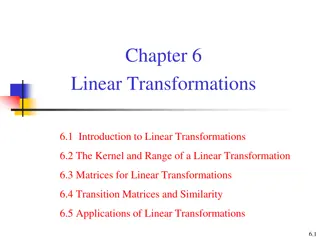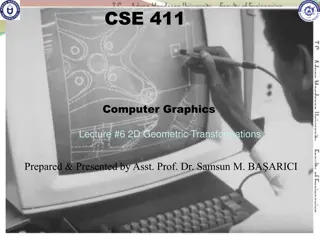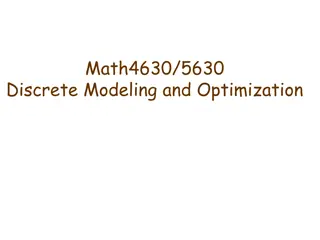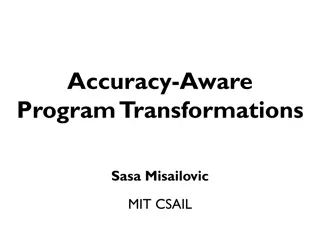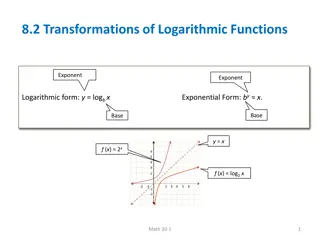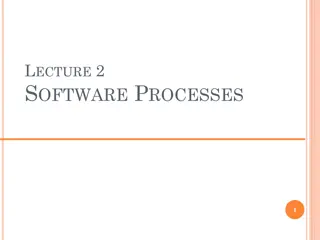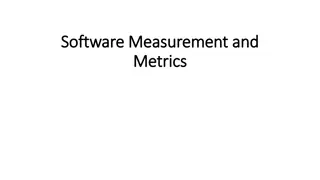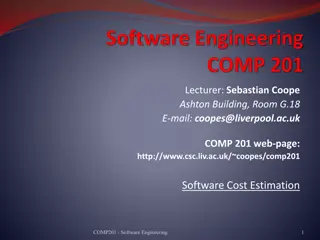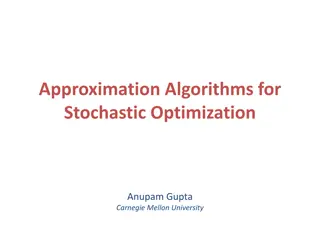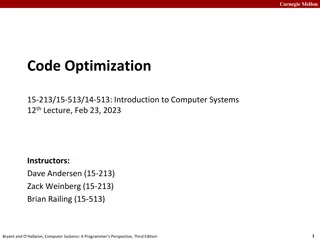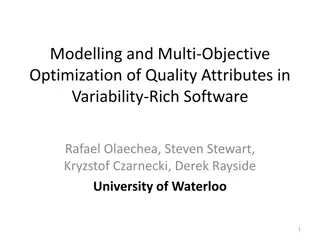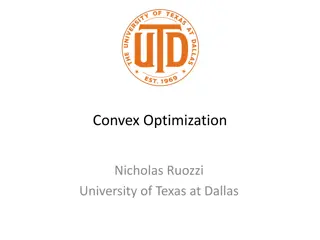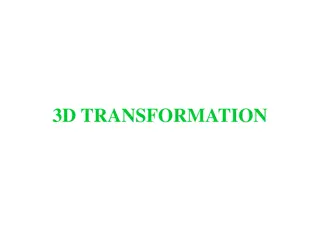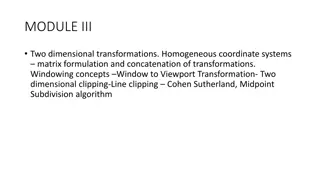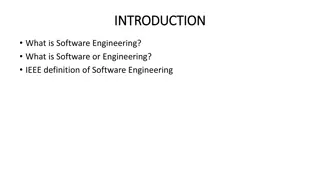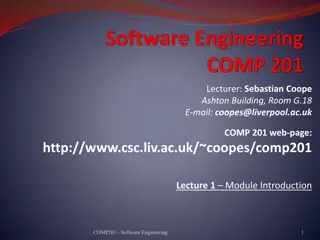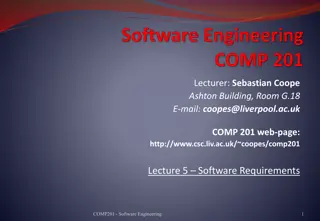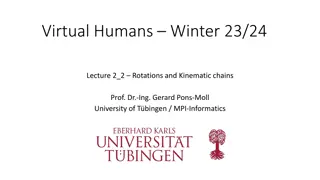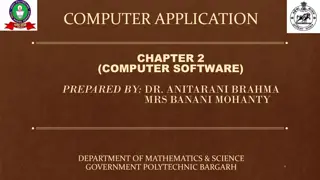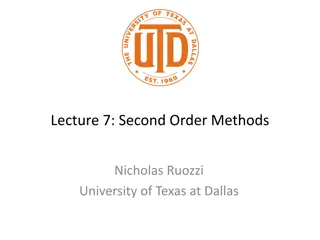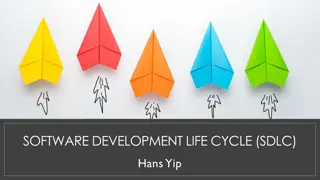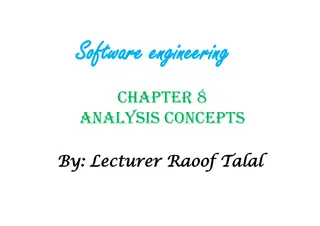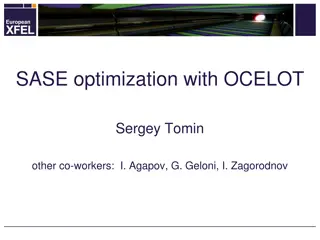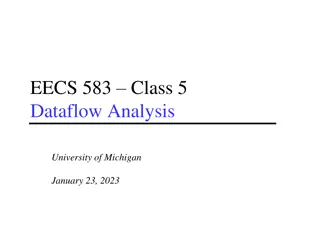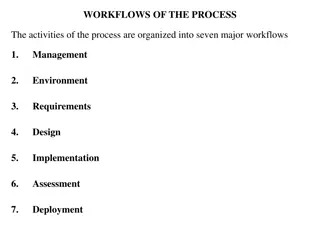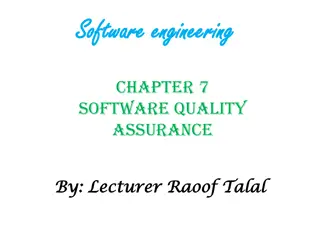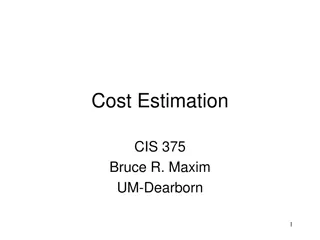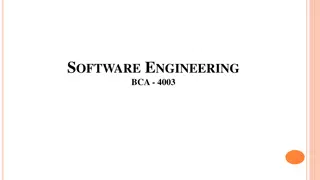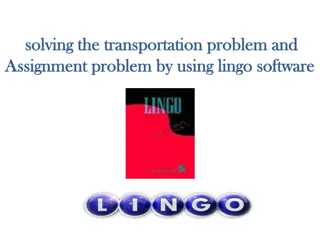Optimization Techniques for High-Level Transformations in Software Development
Exploring optimization techniques for high-level transformations in software development, focusing on moving expensive computations out of critical paths to improve performance. The content discusses fun.CG function variations, a void.dtrans method for data transformation, and a void.pack method for data packing, all aimed at enhancing computational efficiency.
Download Presentation

Please find below an Image/Link to download the presentation.
The content on the website is provided AS IS for your information and personal use only. It may not be sold, licensed, or shared on other websites without obtaining consent from the author. Download presentation by click this link. If you encounter any issues during the download, it is possible that the publisher has removed the file from their server.
E N D
Presentation Transcript
fun CG(A, M, b, x, ?) ? = ? ? ? ? = ? 1 ? ? = ? ; ? = ? ? for?:= 1:????(?) ? = ? ? ? = ? /(? ?) ? = ? + ? ? ? = ? ? ? if ( ? ? < ?2) return? ? = ? 1 ? ???? = ? ? ? = ???? / ? ? = ???? ? = ? + ? ? end return? Very high-level transformation Performance bottleneck - Operation is expensive - The result is used right away
fun CG(A, M, b, x, ?) ? = ? ? ? ? = ? 1 ? ? = ?; ? = ? ? for?:= 1:????(?) ? = ? ? ?:= {?,? ?,?,?,?,?,?} ? = ? /(? ?) ? = ? + ? ? ? = ? ? ? if( ? ? < ?2) return? ? {?,?,?,?,?,?} ???? = ? ? ? = ???? / ? ? = ???? ? = ? + ? ? end return? Idea: Move the expensive computation out of the critical path Computation of z no longer involves matrix multiplication The idea is simple, but we need to figure out the details
fun CG(A, M, b, x, \epsilon) ? = ? ? ? ? = ? 1 ? ? = ?; ? = ? ? for?:= 1:????(?) ? = ? ? ?:= ? ? ? ? = ? /(? ?) ? = ? + ? ? ? = ? ? ? if( ? ? < ?2) return? ? ? ? ? ???? = ? ? ? = ???? / ? ? = ???? ? = ? + ? ? end return? Synthesizer can figure this out in < 3 min.
void dtrans(int nx, int ny, int nz, int N, double[nz/N, ny, nx] LA, ref double[nx/N, ny, nz] LB) { int bufsz = (nx/N)*ny*(nz/N); view LA as double[N, bufsz] abuf; view LB as double[N, bufsz] bbuf; pack(LA, bbuf); All_to_all(bbuf, abuf); // re-distribute unpack(nx, ny, nz, abuf, LB); }
void pack([int an1, int an2, int an3, int bn1], double[an1, an2, an3] in, ref double[nprocs, bn1] out) { view out as double[nprocs*bn1] fout; for (int i = 0; i < an1; i++) for (int j = 0; j < an2; j++) for (int k = 0; k < an3; k++) fout[i*dim()+j*dim()+k*dim()] // i+j*an1+k*an1*an2 = in[i][j][k]; } gen intnum() { return {| an1 | an2 | an3 | bn1 | nprocs |}; } gen intdim() { return {| ?? | num() | num()/nprocs | dim()*dim() |}; }
void unpack([int an1, int bn1, int bn2, int bn3], double[nprocs, an1] in, ref double[bn1, bn2, bn3] out) { view in as double[nprocs*an1] fin; view out as double[bn1*bn2*bn3] fout; for (int p = 0; p < nprocs; p++) for (int i = 0; i < dim(); i++) // bn1 for (int j = 0; j < dim(); j++) // bn2 for (int k = 0; k < dim(); k++) // bn3/nprocs fout[p*dim() + i*dim() + j*dim() + k*dim()] // bn3/nprocs, bn2*bn3, bn3, 1 = fin[p*dim() + i*dim() + j*dim() + k*dim()]; // an1, bn2*bn3/nprocs, bn3/nprocs, 1 } gen intnum() { return {| an1 | an2 | an3 | bn1 | nprocs |}; } gen intdim() { return {| ?? | num() | num()/nprocs | dim()*dim() |}; }
void tester(int nx, int ny, int nz, double[nz,ny,nx] A, ref double[nx,ny,nz] B) implements trans { assume nz % nprocs == 0 && nx % nprocs == 0; spmdfork { double[nz/nprocs,ny,nx] LA = distribute(A); double[nx/nprocs,ny,nz] LB = distribute(B); dtrans(nx, ny, nz, nprocs, LA, LB); collect(A, LA); collect(B, LB); } }


